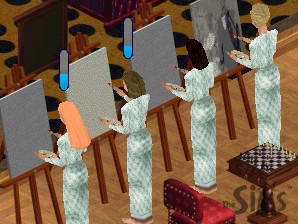Monday 26 February 2001

|
Pic of the day: No matter how unusual your interests are, chances are you can join a group of likeminded people. (Relax, they're only virtual barbie dolls. Screenshot from The Sims.) It's an e life: GroupsThe Internet is not TV or newspapers. The Internet is not telephone or mail. It is all of this, to some extent. But more than that, it is groups. Groups on the Net can take different forms, from the decade-old newgroups on Usenet to the spontaneous creation of a new chat room for the evening when an old one is getting crowded. The power to join, leave or even create groups at whim is one of the greatest attractions of the Net. Groups and communities may be different things, but the line can be pretty vague. For instance, online comics usually have a forum (or electronic message board) each. Here the fans can meet each other and often also the creator of the comic, with their questions and commentaries, their critique and praise. What usually happens is that these people get to know each other in a way through their posts, and start to interact like a social group. Even though they may live in different parts of the world, be of different age and occupation and faith and political leaning ... they still start to interact in the typical human way. They cooperate, they compete, they tease and encourage, and play on each others emotions. A determined person may also be able to use the Net to create new groups from existing groups. For instance, if I went to the boards of the various "furry" comics (with animal characters) and told them about the current campaign of systematic slaughter against wolves here in Norway, I am pretty sure we could create a workgroup pretty fast and organize some kind of action. The members would probably know of other groups they are part of which would also be interested. Not that I'm going to do that, of course. With the Internet, it is easier to retain groups after the event that caused them to form. For instance, when I left high school more than 20 years ago, we were soon dispersed. Some went on to the nearest college (still way too far to travel daily) and others got a job or went into other studies. We sent a few letters to our best friends, and then it sort of died out. If we had lived in the age of the Net, we could have made our own mailing list or bulletin board and stayed in touch for as long as we wanted to, cheaply and easily. ***Far from isolating people, the Internet is a social power tool. It lets friends stay in touch, and people with common interests become friends. This, of course, depends on them wanting to stay in touch and wanting to make friends. There are some people who just want to anonymously join groups and act like toddlers with a full diaper. Luckily, most group software has utilities to make people invisible. (Right click on the name, then Ignore.) Intriguingly, my observations indicate that there are more people who like to be provoked than there are people who like to provoke. For each hissyfitting toddler there will be two or three hissyfitting older siblings. (Metaphorically speaking, of course.) As technologies spread, groups stretch across several platforms. For instance, let's say you play an online strategy game like Planetarion. Mostly, you only need to stop by once a day or so, perhaps even less, to start building a new factory or a bunch of ships. But if your allies suddenly get attacked, you may wish to be there to help them out. For this reason, you can leave your mobile phone number so someone can SMS you. Incidentally, my mobile phone number is (country prefix +47) 92 800 445. The phone is rarely on, though, so e-mail is probably faster. I've also got a new ICQ number: 109542150. (Also works with the Opera Instant Messaging, for those lucky enough to use that browser.) In the near future (as in: prototypes now) there will be mobile phones and datapads with a location sense. They can define within a few meters where you are, and may react to the presence of mutual friends who have exchanged codes. This should further blur the gap between the e world and the flesh world. But already that distinction is quite up to each person. As I said, some prefer to stay anonymous and do the things they have secretly wanted to do, usually involving sex or aggression or both of the above. Others take a very different approach. For instance, such a scholarly group as the Usenet newsgroup rec.arts.sf.written.robert-jordan has developed a core society of regulars, many of who travel for hours to visit one another during the so-called "Darkfriend Socials". This is especially common in the USA, but there are also socials here in Scandinavia from time to time. (I'm not quite that regular, and I don't like travel, so I've considered against it each time so far.) Nor are these events fan conventions in a regular sense ... the focus is usually on the purely social, with fiction shopping as a minor distraction. Or so I've heard. (And I've seen the photos to prove it. Ahem.) As a general rule, you don't just wander into such a close group. Think of it more like immigrating to a well-to-do country, like Norway or Canada. A very good idea would be to look and listen for a while before you campaign for sweeping reform, or people are likely to inform you in various ways that this society was doing quite fine before you showed up, and will continue to do so after the revolving door has hit your chubby backside on the way out. |
And today, it snowed. |
Yesterday <-- This month --> Tomorrow?
One year ago
Two years ago